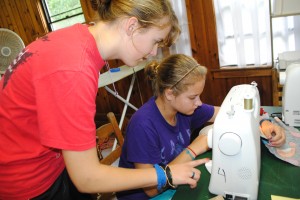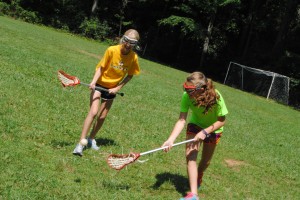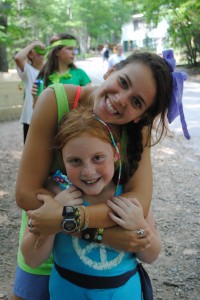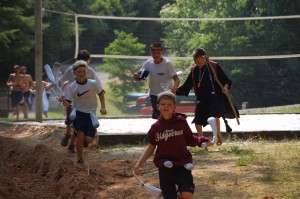AUTHOR ARCHIVES: Sharon
Betsie’s First Experience at Crestridge
Posted by SharonWe recently saw a blog post that one of our parents posted about their daughter’s first experience at Crestridge this past summer. Betsie attended Starter Camp at the end of the summer and could not stop talking about her time at camp! Her best friend was able to attend as well and it’s safe to say their friendship was strengthened.
We love hearing how God uses Crestridge and Ridgecrest to grow these campers! Read more about Betsie’s experience from a parent’s perspective…
http://www.our-everyday.com/2014/09/chippewa.html

Posted in Just For Parents | Tagged Camp Crestridge, Camp Ridgecrest, Chippewa, Confidence, Independence, Our Everyday, Ridgecrest Summer Camps | Leave a reply
Elfed
Posted by SharonChristmas is a great time for traditions and doing things with your family and friends. One again this year Ridgecrest Summer Camps has an idea to try! It’s called “Elfing”. It’s a great thing to do with your kids that will help them bless someone else. Here’s a short video to explain the concept. Your printout is located below the video…
Below is the link to the note you leave with the Christmas treats. Happy Elfing!
You will need to print this document out to start Elfing….Elfing Directions 2013
Posted in Just For Parents | Tagged Camp Crestridge, Camp Ridgecrest, Christmas, Christmas Treats, Elfed, Elfing, Ridgecrest Summer Camps | Leave a reply
“How To Get More Than A Grunt”
Posted by Sharon Have you ever picked up your child from camp and asked, “So how was it?” What kind of response did you receive? Did they go into detail about the activities, their counselors, their cabinmates, the food they ate? I’m sure you have also experienced this during the school year when you ask a question and the only response you receive is, “fine”.
Have you ever picked up your child from camp and asked, “So how was it?” What kind of response did you receive? Did they go into detail about the activities, their counselors, their cabinmates, the food they ate? I’m sure you have also experienced this during the school year when you ask a question and the only response you receive is, “fine”.
I came across an article recently by Paul Robertson called, “How to get more than a grunt”. When I was growing up, this was me. My parents were the last people I wanted to talk to about what was going on. Even though they tried hard, I didn’t give them the response they hoped for.
The principles in this article can be applied to camp. When the campers get picked up on Closing Day, they are feeling all sorts of emotions. They’re happy to see their family and friends at home and to actually be at home. But they’re also sad to leave their friends at camp and the environment at camp. During the ride home, they may be excited to give highlights. But what about the deeper things? It is important to know that it may take time for your child to process the things they learned at camp, whether it was how to set the table or learning about the relationship they can have with Christ. If you ask a question on the ride home or the day after and they respond with a short sentence, give them more time to process and let those new experiences settle in. Here are some questions you can ask throughout the following weeks after your child comes home:
Tell me about your counselors.
What was your favorite activity?
What was the Theme this summer? Tell me about it.
Who do you want to keep in touch with?
What was the hardest challenge?
Tell me about something you accomplished while at camp.
Tell me about your camping trips.
What skills did you take? What did you learn in those skills?
By asking questions like this, you will able to get an accurate picture of what your child experienced at camp. If you have any questions you’d like to add, please do so in the comment section below.
Sharon Aylestock
Assistant Director, Camp Crestridge
Posted in Just For Parents | Tagged Camp Crestridge, Camp Ridgecrest, CPYU, Experience, Questions, Ridgecrest Summer Camps, Summer | Leave a reply
Winners or Losers?
Posted by Sharon I learned some amazing lessons about life when I was a starting forward on the worst basketball team in the history of the world. We were a sloppy group of pre-pubescent sixth and seventh graders who took to the gym floor on Friday nights in the ugliest uniforms you’ve ever seen. With “St. Mark’s” emblazoned in road cone orange across the front of our jet black polyester jerseys, our hearty band of clumsy wannabes would begin warm-ups hoping “tonight’s the night we’ll win our first one.” We never allowed the fact that we had difficulty putting the ball through the hoop during the pre-game lay-up drill to shatter our dream.
I learned some amazing lessons about life when I was a starting forward on the worst basketball team in the history of the world. We were a sloppy group of pre-pubescent sixth and seventh graders who took to the gym floor on Friday nights in the ugliest uniforms you’ve ever seen. With “St. Mark’s” emblazoned in road cone orange across the front of our jet black polyester jerseys, our hearty band of clumsy wannabes would begin warm-ups hoping “tonight’s the night we’ll win our first one.” We never allowed the fact that we had difficulty putting the ball through the hoop during the pre-game lay-up drill to shatter our dream.
But the dream that refused to die never materialized as we showed up each week to play in a church youth league where every team but ours was manned by towering muscle-bound high school seniors and juniors. For two seasons, we never gained control of the ball on the opening tip-off. In fact, it seemed like we never had the ball. And when the final buzzer sounded, we never walked off with the scoreboard tilted in our favor. No team ever scored less than 100 points against us. Our scrappy team never scored more than 12 points in a game. In my entire two year basketball career, I poured in a whopping two points.
Do you know why I smile fondly as I remember that experience? Because it was fun. Our coach and parents never yelled. They always encouraged. They never made us feel like losers. If and when we scored, the entire place, would erupt with a cheer. Because of that, I can remember every detail of the one basket I made. I’ve forgotten my dozens of shots that missed. When the game was over, we always smiled. Playing for St. Mark’s taught me a lot about attitude, character, and the fact that basketball is only a game.
In the years since my days of basketball “glory”, I’ve had the opportunity to spend a chunk of time coaching teams and watching my own kids play organized sports. I’ve never taken my teams to a world championship nor are the odds great for my kids or any of their teammates to make a living playing games. Yet I wonder why the sidelines, stands, and team benches are peppered, sometimes covered, with parents and coaches who pressure and push their kids with a “succeed at all costs” attitude. These parents and coaches bully kids right out of childhood into the overwhelming frustration of a burned out “I have failed” existence. I must admit, there are times when I’m tempted to go with the flow of these attitudes. Have you ever felt the need to push a little bit harder so your kid’s not left in the dust?
Vincent Fortanasce is a psychiatrist, coach and member of the Little League Hall of Fame. In his book, Life Lessons from Little League (Doubleday), he relates how he asked parent’s at the initial team meeting about what they first ask their children after a game, if they had not been able to attend. The most common question was “Did you win today?” The second most frequent question was “How did you do?” Fortanasce writes, “What was my point? Simply that I wanted my team parents to re-focus away from ‘I want my child to learn to win,’ or the pursuit of perfection, to the pursuit of contentment and confidence; from ‘I want my child to be the best player on the best team’ – the pursuit of talent – to ‘I want my child to be a good sportsman’ – the pursuit of character.” He suggests that the more appropriate questions are “Did you have fun?” or “What did you learn today?”
Plato said, “You can learn more about a person in an hour of play than you can in a lifetime of conversation.” A twist on Plato’s words ring true today: we can learn quite a bit about a parent in a few minutes of observing them watch their own child play. What do you see when you look in the mirror? As you evaluate the role you play in the lives of the kids you parent and/or coach, consider these questions:
Who’s out on the field? Unfortunately, some parents see their kids as a second chance to fulfill dreams they themselves never realized. Best selling recording artist Alanis Morrisette’s gripping song Perfect echoes the experience of too many kids: “I’ll live through you, I’ll make you what I never was/If you’re the best, then maybe so am I. . . you’ll make up for what I blew/what’s the problem. . . why are you crying?”
What’s on your mind? Mark understood when his talented 17-year-old son Travis asked to quit playing ice hockey. The win-at-all costs mind set of his coaches and teammates’ parents had finally gotten to be too much for Travis. Mark says that in youth sports today “the child’s welfare is becoming less and less important. The focus should be on instruction and developing character. But you wonder about some of the coaches and parents today . . . the bottom-line is that I never saw Travis smile when he played. . . I supported his decision 100 percent.” As a result of their decision, Travis Howe won’t be the third generation of the Gordie Howe family to play in the uniform of the National Hockey League’s Detroit Red Wings. For the Howe’s, character won out over winning.
What’s in your heart? Are the desires of your heart to see your child do his/her best. Or, is your heart set on a standard or level of achievement that is impossible for your child to attain. When sports psychologist Rick Wolff worked for the Cleveland Indians, he was surprised to discover that there were a large number of major league ball players who didn’t allow their kids to get involved in Little League baseball. The reason: the pressure on kids to excel beyond their ability and potential. Instead, they encouraged their kids to skateboard, ski, or anything else to keep them from the unnecessary pressure placed on youth league baseball players. After all, it’s only a game . . . and they’re only kids! Let them play and have fun!
What’s coming out of your mouth? “Frustrated parents . . . can attack the umpires, berate the managers and coaches, and demean the players on the field with impunity”, writes Fortanasce. “Some go the full hundred yards in criticizing their children’s teammates – and even their own children.” I’ve watched young kids cower and teenagers become bitter in response. And even if they do respond with improved performance, are those critical attitudes qualities that we want to nurture in our kids? Children learn from example. If we’re going to scream anything, it should be words of praise, encouragement, and acceptance.
In this day and age of increased activity, it’s realistic to assume that most kids will spend some time during their childhood in a uniform participating in some kind of organized sport. Hopefully, you and I will be on the sideline cheering them on. It would be a good idea for all of us sports parents to pinch ourselves and come back to reality. We’d realize that there’s a greater chance of getting hit by lightning than of our child growing up to sport a world series ring, wear the Olympic gold, or skate around holding the Stanley Cup.
Our children will grow up with memories of their childhood sporting experience. Those memories will be either positive, or negative.
I look back on my role as a player on the world’s worst basketball team with a smile on my face. Why? Because it was awesome. When the dust settled, I know that I came away from that “losing” experience as a real winner. Nobody screamed . . . nobody pushed . . . nobody lived their dreams through me. I hope my kids will be able to someday look back and do the same. How about you?
by Walt Mueller
The Center for Parent/Youth Understanding
Posted in Just For Parents | Tagged Camp Crestridge, Camp Ridgecrest, Just for Parents, Loser, parent articles, Ridgecrest Summer Camps, Sports, The Center for Parent/Youth Understanding, Winner | Leave a reply
Is Santa Real?
Posted by Sharon I personally do not have children but I do have 3 nieces and 2 nephews who I love like my own children. I could talk your ear off about them, but this is not my chance to do that! I’ve realized that my brothers and sister-in-laws get to teach them everything in the early years of their children’s’ lives. For the first several years, they get to determine what their children believe in, what is true, and what will become tradition.
I personally do not have children but I do have 3 nieces and 2 nephews who I love like my own children. I could talk your ear off about them, but this is not my chance to do that! I’ve realized that my brothers and sister-in-laws get to teach them everything in the early years of their children’s’ lives. For the first several years, they get to determine what their children believe in, what is true, and what will become tradition.
One of those traditions that is upon us in this Christmas season is Santa Claus. As a parent, you’ve probably heard the question, “Is Santa Real?” When I was younger, I believed in Santa. My parents still sign their name on presents as Santa. At Crestridge, we celebrate Christmas in the summertime and Santa Claus comes to visit. It’s fun and magical. I recently read an interesting article by Mark Driscoll that talks about how to talk to your kids about Santa. I’m sure it is exciting, yet difficult to decide what your approach will be on instances like this; what you are going to teach your children. There is no one way to parenting but I’d like to pose a few questions:
How do you talk to your kids about Santa?
What personal Christmas traditions do you see as most important to pass on to your children?
Besides giving a present to a family member, what is something you are currently doing or can do to teach your kids about a giving spirit?
Here’s an article I’d like to pass on by Mark Driscoll that is a possible approach in how to talk to your kids about Santa…
http://onfaith.washingtonpost.com/onfaith/panelists/mark_driscoll/2010/12/what_we_tell_our_kids_about_santa.html
We hope you have a wonderful time celebrating Christmas and Christ’s birth with your children!
Sharon Aylestock
Assistant Director, Camp Crestridge for Girls
Posted in Just For Parents | Tagged Camp Crestridge, Camp Ridgecrest, Christmas, Christmas Tradition, Mark Driscoll, Ridgecrest Summer Camps, Santa Claus, Tradition | Leave a reply
The Value of Hard Work
Posted by SharonMy p arents are two of the hardest workers I know. They did whatever it took to support my family as I was growing up. That meant having multiple jobs at times and sacrificing time with family and friends. Their work ethic was instilled in me from the beginning. I had a job as early as middle school helping them clean an office building each week, babysitting, and helping my dad make bookmarks for his job. Then I got my first “real” job during my freshman year of high school at Baskin Robbins. I learned so much throughout the 2 years that I worked there. I learned how to work with non-believers and people with different personalities, the responsibility of being to work on time and doing what was asked of me, integrity, how to share my faith with other employees, balancing a work schedule with homework, how to earn money to pay for things I wanted, how to take constructive criticism, and when to say no (I realized I was eating too much “leftover” milkshakes as they were being made). I do not think I would have learned those things as quickly if I did not have a job at an early age. After my time at Baskin Robbins, I went on to other jobs throughout the rest of high school and college.
arents are two of the hardest workers I know. They did whatever it took to support my family as I was growing up. That meant having multiple jobs at times and sacrificing time with family and friends. Their work ethic was instilled in me from the beginning. I had a job as early as middle school helping them clean an office building each week, babysitting, and helping my dad make bookmarks for his job. Then I got my first “real” job during my freshman year of high school at Baskin Robbins. I learned so much throughout the 2 years that I worked there. I learned how to work with non-believers and people with different personalities, the responsibility of being to work on time and doing what was asked of me, integrity, how to share my faith with other employees, balancing a work schedule with homework, how to earn money to pay for things I wanted, how to take constructive criticism, and when to say no (I realized I was eating too much “leftover” milkshakes as they were being made). I do not think I would have learned those things as quickly if I did not have a job at an early age. After my time at Baskin Robbins, I went on to other jobs throughout the rest of high school and college.
I do not want to try and convince you that all kids should have a job throughout high school and college. However, I would not be the same person I am today if I had not had a job. It seems more and more kids do not have a paying job until they come work at camp or get out of college. Where are they learning those qualities? Where are they learning about responsibility and the value of working hard? If you prefer your child not work, what are ways you can teach your children those valuable traits and lessons?
School is a great place to learn how to interact with others and how to balance schedules and homework. But what about earning money, managing money, having a bank account? It was such a great feeling to buy something I wanted knowing I worked hard for that money. It helped me to respect the things I had. I would encourage you to think about the value of having a job at a young age and if that would benefit your child.
Sharon Aylestock
Assistant Director, Camp Crestridge
Posted in Just For Parents | Tagged Camp Crestridge, Camp Ridgecrest, Hard Worker, Jobs, Ridgecrest Summer Camps, Work Ethic | Leave a reply
It Starts When You’re Young
Posted by SharonWhen I was growing up, my parents were more concerned with being able to put food on the table, not necessarily feeding my brothers and I the most healthy food. Throughout college and the first couple years I lived on my own, I ate whatever was easy to make and least expensive because that’s how I was raised. I am realizing that how I was raised plays a huge role in how I act today.
I am currently taking an EMT (Emergency Medical Technician) class to add another level of medical care at camp. While studying Anatomy, Physiology, and Cardiac problems, I realized how important it is to eat healthy and exercise. The most important thing I’ve learned about Cardiac problems is that you can’t just start taking care of your heart when you are middle-aged. You can’t reverse the plaque build up in your arteries. It starts when you’re young! That is why it is so important to make sure your kids are eating healthy and exercising when they are young. They will continue those habits as they grow older because that is how they were raised. Doesn’t this concept apply to other areas of life? What about their friendships and relationships with the opposite sex? How about time management if they are involved in extracurricular activities?
We focus on four areas of growth at camp-spiritual, social, mental, and physical. We challenge our campers to be active at camp. Your kids get to run around, go swimming, hiking, make forts, and do activities they typically don’t get to do at home. We want to show them that exercising is fun especially when you do it in different forms like those just listed.
What activities do you do as a family? How often are you outside with your kids? How has your childhood affected who you are today?
Sharon Aylestock
Assistant Director, Camp Crestridge
Posted in Just For Parents | Tagged Camp Crestridge, Camp Ridgecrest, Christian Camping, Just for Parents, parent resources, Ridgecrest Summer Camps | Leave a reply
ATTENTION: CAMP MOMS
Posted by SharonThere’s nothing like watching your child run up to you on closing day with a huge smile on their face to give you a big hug…so big that it makes up for the two weeks of no hugs. Then you ask if they had a good time and they go off on how much fun they had, telling you about their campout, the fire they got to build, the frog they caught by the lake, the new song they learned, the wreck they had in the mountain biking skill, the time they spent learning about God, talking to God, or how their love for God grew in so many ways. To me, that would be one of the most amazing feelings as a parent!
How often do you tell your friends about that feeling and the experience your child had at camp? Whether it be everyday or not very often, we want to make it easier for you to tell your friends about Ridgecrest Summer Camps. There are a few promotionals materials that we would like to make available to you. We have promotional DVD’s, brochures, a sample newsletter entry, and sample announcements. You can use these materials at your church, a small group meeting, a youth group, Sunday school class, your child’s school, a club meeting, or even with your child’s close friends and parents. God has changed and will change so many lives through camp and this is your chance to spread the excitement! If you have any questions or would like to receive any promotional materials, please e-mail us at rscamps@ridgecrestcamps.com. We’ll mail you whatever you need at no cost. And we’d be glad to share with you some of the best ways to impact your community through sharing with others a lifechanging summer camp experience!
Posted in Just For Parents | Tagged Camp Moms | Leave a reply




